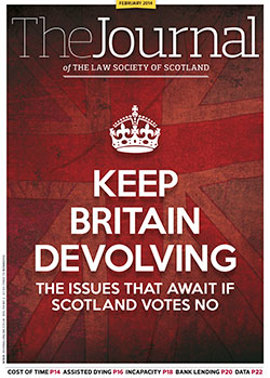President's column
One of the fascinating aspects of the Presidency is the range of people – individuals and groups – with whom one comes into contact. A case in point was a round table event at Edinburgh City Chambers with the Lord Mayor of the City of London, Alderman Fiona Woolf, who was brought up in Edinburgh.
This was part of Edinburgh City Council’s annual engagement with the Lord Mayor; this year, we have worked closely with the council to bring opportunities for promotion of the legal profession along with financial services to the table. To say the event was thought provoking would be an understatement; and the Lord Mayor left with a much clearer understanding of our main niche strengths, and an enthusiasm to help us leverage them during her packed year in office.
There are further such opportunities in key sectors; next year’s Commonwealth Law Conference in Glasgow is one. Keep abreast of developments on the website, now live at www.clc2015.co.uk Also hot off the press as I type is the announcement of James Wolffe QC’s election as Dean of the Faculty of Advocates. He will, I am sure, make an excellent Dean; I wish him well and we will be meeting him shortly on a range of matters.
Corroboration again
In line with our commitment to finding a constructive way forward on the corroboration issue, the Society held a round table event last month for groups supporting and opposing abolition. With those taking part representing Government, prosecutors, victims, lawyers and human rights concerns, a range of views was expressed.
While, as expected, no consensus on the question of abolition was reached, there was unanimity that the process of reviewing the law, whether additional safeguards or corroboration itself, must be fully participative if it is to be effective. The Scottish Government has now announced that the provision abolishing corroboration should not take effect until after a review of additional safeguards.
While the concession is welcome, the Society continues to believe that the rule is a cornerstone of the criminal justice system and an essential safeguard against the risk of miscarriages of justice. Also, failing to remove the provision from the bill appears to be at odds with the commitment of the Government and Parliament to making good law.
The most appropriate course would be to remove the corroboration provision from the Criminal Justice Bill and create a statutory panel to review this complex issue comprehensively. A short bill could be introduced later to give effect to its recommendations. I have written to the Cabinet Secretary emphasising these views.
Needless to say, the Society will play a full part in any review, and we intend to hold a follow-up to our round table to further the aim of building a modern, effective criminal justice system.
Fair access
At Council last month, a wide-ranging action plan aimed at improving access to the solicitors’ profession was approved, following extensive research into all elements of the route to qualification, from careers advice in schools to studying law and entering the profession.
The action plan will play a significant role in ensuring that the profession is open to as wide a variety of people as possible, including those from less privileged backgrounds, while the highest standards in education and training are maintained.
Also at Council, further illustrating our determination to improve and modernise the way we work, constitutional changes to allow e-voting in Council elections were agreed and will be put to members at the AGM on 4 April. As well as the formal business, the AGM will also include an address from the Lord President on the future landscape of the Scottish justice system, and a panel debate on a similar theme. I encourage as many members as possible to attend.
The Society’s latest polling among solicitors and others has provided some interesting findings. More than half of members, and MSPs, were either very or fairly favourable towards the Society, while around a third held a neutral view and only a small minority were unfavourable. On the economy, MSPs were most optimistic about the prospect of recovery, but solicitors were significantly more hopeful than the general public. Those working in big firms, and property lawyers, were the most optimistic, while high street and legal aid solicitors had the greatest reservations about their economic prospects. We will reflect on the results, and in the meantime continue to focus on those areas of work identified in the poll as priorities to the profession – our regulatory role, law reform, legal aid, and conveyancing issues. Finally, it was a real privilege to introduce 13 new solicitor advocates to the Supreme Courts in Scotland to take the declaration of allegiance. Congratulations to you all – it is no mean feat to pass the rigorous assessment necessary. To echo the words of the Lord President, I hope you all use those rights – and enjoy doing so.
In this issue
- Cold case examination of early childhood evidence
- Incentivising employee ownership
- The diversity imperative
- Towards a more inclusive democracy
- Journal magazine Index 2013
- Reading for pleasure
- Opinion: Campbell Read
- Book reviews
- Profile
- President's column
- RoS's services for solicitors
- Issues for the Union
- Critical mass
- Is this where it ends?
- Testing capacity
- Making plans for auto-enrolment
- Loosening the purse strings
- Data: don't be caught out
- Punished enough?
- Prior statements practice
- Family business musings
- TUPE: armour not gold-plated?
- Pension policy - a vote winner?
- Scottish Solicitors' Discipline Tribunal
- In with the system
- Check and double-check
- Lender Exchange ahead
- Have you the capital?
- How not to win business: a guide for professionals
- Reflections from the Complaints Commission
- Ask Ash
- Danger spots
- It's the name of the game
- Law reform roundup
- Conference aspires to judicial diversity






